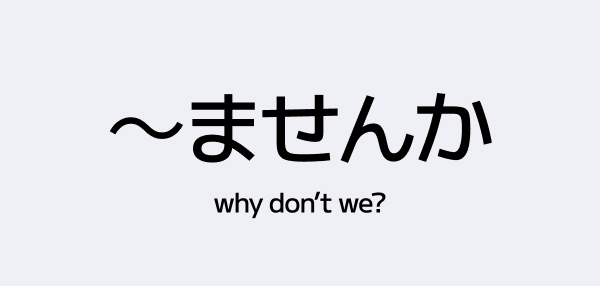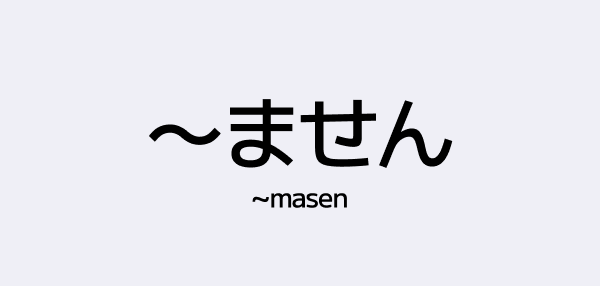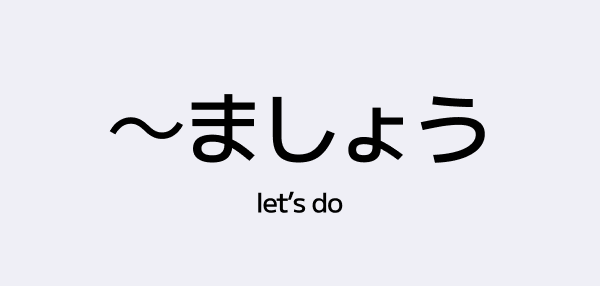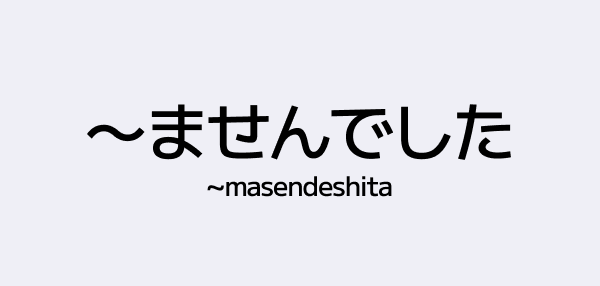~ませんか – How to Politely Say “Why Don’t We…?” in Japanese

Want to ask someone to do something together in a polite, gentle way?
Instead of saying “Let’s go,” how about:
“Would you like to go?” “Why don’t we ___?”
That’s what ~ませんか is for.
It’s a common way to invite someone to do something, especially when you don’t want to come off as too pushy.
In this guide, you’ll learn:
- What ~ませんかmeans and when to use it
- How to form it with any verb
- The difference between ~ませんか and ~ましょう
- Real-world examples and soft-sounding invitations
- Practice exercises to try it out yourself
What Does ~ませんかMean?
「~ませんか」is a polite and soft way to ask:
“Would you like to...?” “Why don’t we...?” “Shall we...?”
It uses the negative question form of a verb, but don’t be fooled, it’s not actually negative in meaning. It's more like:
- “Would you care to join me?”
- “Want to ___ together?”
It’s gentle, polite, and ideal for inviting people you don’t know well yet — like classmates, coworkers, or even your crush 😳
Mistranslations?
If you've ever seen weird translations from Japanese to English where it looks like "Don't you want to see the autumn leaves in Kyoto?" or "Don't you want to see the sakuras?", it's likely coming from this grammar form.
~ませんかsounds like "Don't you want to do X?" so it's easy for literal translations to go awry. In English, it sounds so forceful that it's a bit cringe.
But in reality, they just wanted to suggest you go see autumn leaves. In the nicest way possible. 😅
How to Make the ~ませんかForm
1. Start with the ます-form of a verb
2. Change ~ます to ~ません
3. Add か
That’s it!
Examples:
- たべます→たべませんか→ Would you like to eat?
- のみます→のみませんか→ Want to get a drink?
- いきます→いきませんか→ Shall we go?
- べんきょうします→べんきょうしませんか→ Want to study (together)?
- きます→きませんか→ Will you come?
~ませんかvs ~ましょう
These two are very similar, but the nuance is different.
- ~ましょう: “Let’s ___.” → More direct, confident invitation
- ~ませんか: “Would you like to ___?” → Softer, more polite suggestion
Think of ~ませんかas a soft invitation and ~ましょうas an offer or encouragement.
Both are encouraging another person to do something, but you can adjust the level of pushiness by switching between these two grammar forms.
Example
- こうえんにいきましょう。→ Let’s go to the park.
- こうえんにいきませんか?→ Want to go to the park (with me)?
The second one leaves room for the other person to say yes or no. It's nice to give people space!
Real-Life Examples Using ~ませんか
いっしょにたべませんか?
Issho ni tabemasen ka? → Would you like to eat together?
このえいがをみませんか?
Kono eiga wo mimasen ka? → Want to watch this movie?
あした、でかけませんか?
Ashita, dekakemasen ka? → Want to go out tomorrow?
おちゃをのみませんか?
Ocha wo nomimasen ka? → How about some tea?
べんきょうしませんか?
Benkyou shimasen ka? → Shall we study?
Pro tip: Add いっしょに(together) to make it sound more inviting!
Practice Time!
Practice 1: Turn into ~ませんか
Make polite invitations using these verbs:
のみます→__________
いきます→__________
します→__________
はなします→__________
たべます→__________
Answers:
のみませんか
いきませんか
しませんか
はなしませんか
たべませんか
Practice 2: Translate It!
Write these in Japanese:
- Would you like to go for coffee?
- Want to watch anime together?
- Shall we study after school?
Answers:
- コーヒーをのみませんか?
- いっしょにアニメをみませんか?
- ほうかごにべんきょうしませんか?
Softening Your Speech Even More
To sound more polite, try adding:
- いっしょに (together)
- どうですか? (how about...)
- ちょっと (a bit — softens tone)
Examples:
- いっしょにばんごはんをたべませんか?😊 → Want to have dinner together? (like when you want to ask someone out)
- このカフェはどうですか?→ How about this café?
- ちょっと いってみませんか? -> How about we go ("a bit" - softened)?
Final Recap
~ませんか is the polite, soft way to invite someone to do something.
- Use it when you want to say “Would you like to ___?” or “Shall we ___?”
- It uses the negative question form, but it’s not actually negative
- Compared to ~ましょう, it’s more polite and leaves room for the other person to decide
Related Grammar
 F Rank
F Rank~ません (Negative polite present)
 F Rank
F Rank~ましょう – How to Say “Let’s Do” in Japanese
 F Rank
F RankThe の (No) Particle
The particle 「の」 connects and clarifies—linking nouns, showing possession, and even turning verbs into concepts. From “my pen” to “eating is fun,” this guide covers all the key uses.
 F Rank
F Rank~ませんでした (Polite Past Negative Form)
